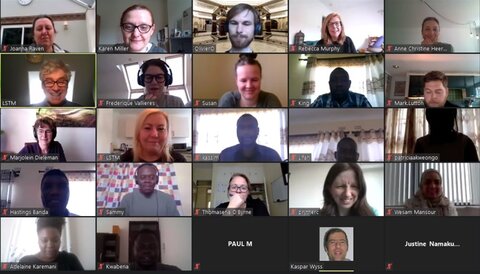Work in the time of Covid

Many months ago, when we began planning the fifth PERFORM2Scale annual workshop, little did we realise how the global health picture would change, and how the aim for the project – to help strengthen help systems in three African states – would be tested. Our very presence in Malawi – the intended location of the workshop - may have put pressure on the health system in a country which, at the time of our cancellation, had no cases of Covid-19.
Fast forward to April and I’m attending our ‘virtual workshop’ from my chilly home in Liverpool, UK rather than the heat of Lilongwe, Malawi. Five days of face-to-face workshops are being condensed into less than three days of online working. But the location and schedule are obviously not the only changes we are experiencing to our usual workshop format.
For people taking part in international collaborations such as PERFORM2Scale, the benefits of virtual working are enormous: more regular communications and less travelling with the associated time-, pollution- and cost-saving benefits being the main of these. However, it is not always simple and Covid-19 is prompting us to learn quickly.
The challenges of online workshops
The first hurdle you encounter is actually getting started. We have found that careful planning of every step of the workshop is essential and that mastery of your software is an absolute requirement. Ok, it may make spontaneity difficult, but it ensures the best use of limited contact, and if you try to keep things fresh and interactive the results are pretty good.
Once you get underway you quickly realise that virtual conversations are often rather stilted – whose turn is it to speak, how do we stop people talking over each other, and why can’t people un/mute themselves? Housekeeping rules are a must and should be defined and adhered to from the outset. Patience is also vital.
Human contact
In large, online groups it’s not possible to see faces and their expressions, introducing an element of guesswork to the proceedings – how are they reacting to what I’m saying? This is exacerbated in our situation where we are relying on audio and shared presentations alone – no video. A couple of speakers have noted how disconcerting it is to present to a silent audience (albeit one that has muted to prevent feedback on their microphones). You know why there’s no reaction to your presentation but you can’t help but stress over it as if you were in an auditorium. We’ve settled on post-presentation written congratulations and smiley emojis, and maybe the odd round of real applause to express our approval and appreciation.
This missing of ‘proper’ contact extends to the times outside the workshop. There is a lot to be said for simply getting to know your partners – sharing a meal, chatting informally, and generally strengthening the bonds of friendship that make working together more pleasant and also more productive.
There was one unexpected bonus to working virtually - we've realised that not all background noise is unwelcome. Babies gurgling in Mali, cockerels crowing in Uganda and songbirds singing in Malawi are so evocative of distant places and remind us that life goes on at this difficult time – especially for those of us enduring a cold, grey day in northern Europe.
So, while in these times of Covid-19 lockdown we are grateful for the ability to work virtually, and acknowledge that there are definite benefits to not travelling great distances, I think it is fair to say that there is still a place in our schedules (and our hearts) for our annual get togethers.